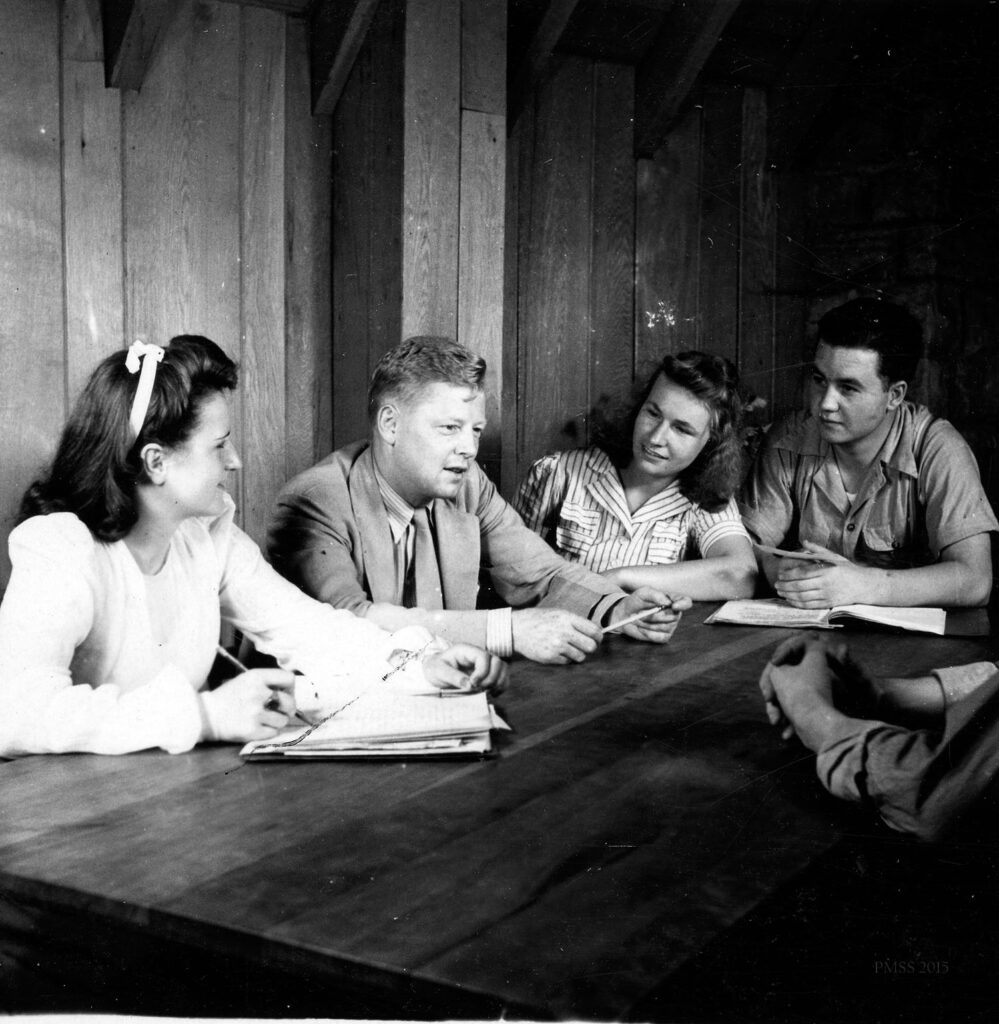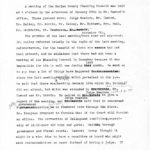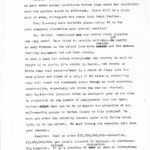Pine Mountain Settlement School
Series 07: DIRECTORS
GLYN MORRIS
1942 Harlan County Planning Council

051 Director Glyn Morris and three students. [garner_ray_051]
GLYN MORRIS 1942 Harlan County Planning Council:
Draft of the Council’s Minutes, January 1942
TAGS: Glyn Morris, 1942 Harlan County Planning Council, meeting minutes, coal camps, rural youth, education, juvenile delinquency, reforestation, juvenile courts, judges, department of public welfare, communities, case studies, juvenile crime, recreation, boy scouts, senior service scouts, civilian defense program, trade schools, teachers
INTRODUCTION: GLYN MORRIS 1942 Harlan County Planning Council
Glyn Morris was a member of the Harlan County (Kentucky) Planning Council which grew out of the 1937 Guidance Institute and in this instance was the recording secretary for the meeting. Present at the meeting were F.M. Meadows, County Judge of Harlan County; James A. Cawood, Superintendent of Harlan County Public Schools; Dr. Clark Bailey, Harlan physician and Council chair, Harlan; the Rev. Eugene H. Rainey, Pastor, Evarts Congregational Church; Mr. Mathews, Closplint, Ky.; Mrs. C.E. (Laura) Ball, Director, Harlan County Girl Scouts; Milton Galbraith, U.S. Employment Service, Harlan office; L. C. Henderson, Superintendent, Harlan City Schools; and Mr. Morris, Director, Pine Mountain Settlement School.
The following are images and transcription of the Harlan County Planning Council 1942 minutes, an edited draft possibly written by Morris. There is no date associated with the minutes. However, the presence of both Judge Meadows who was elected to office in 1941 and Glyn Morris place it in early 1942.
Dr. Clark Bailey served on the Pine Mountain Board of Trustees and was integrally involved in activities at the School and also in the coal-mining town of Harlan where he served as chair of the Harlan Independent Board of Education for a number of years starting in the late 1930s. The Harlan County Planning Council worked closely with Director Glyn Morris in support of the Guidance Institute as it was focused on the needs of youth in the county and in the neighboring towns of Harlan, Cumberland, and to some degree in Lynch and Benham, Kentucky.
Pine Mountain struggled with enrollment issues in the early years of the School and excluded coal camp children from enrollment at Pine Mountain. However, PMSS soon realized that some of the greatest needs were in the mining villages and towns. When Morris left Pine Mountain, he returned a few years later to work with School Superintendent, James Cawood, to establish a model educational program at Evarts, near the town of Harlan.
NOTE: The following is a transcription of the Harlan County Planning Council 1942 minutes. The original text was a typewritten draft, possibly by Glyn Morris, then-secretary of the Council. The editor is unknown, but may have also been Morris. The edits, where legible, are indicated by brackets. The transcription has also been slightly edited for readability.
001
A meeting of the Harlan County Planning Council was held at 4 o’clock in the afternoon of January 20th in Mr. Cawood’s office. Those present were: Judge Meadows, Mr. Cawood, Dr. Bailey, Mr. Morris, Mr. Rainey, Mr. Mathews, Mrs. Ball, Mr. Galbraith, Mr. Henderson. [, Mr. Marthis.]
The minutes of the last meeting [November 7th] were read and approved. Dr. Bailey referred briefly to the topic of the last meeting, reforestation, for the benefit of those who had not been present, and he explained that there had not been a meeting of the Planning Council in December because it was impossible for him to call one during last month. He went on to say that a lot of things have happened since the last meeting [— things] which pertained to the P.C. (Planning Council). He said that there was [a] meeting January 19th which Dr. Bailey did not attend, but which was attended by [J? Meadows,] Mr. Cawood, and Mr. Morris. He called on Judge Meadows [, called on to?] to give a report of the meeting, and Judge Meadows said that it concerned a government service [to] [which may] be rendered here through the State. Mr. Thompson proposed to furnish that if the Court will furnish an office. The correction of delinquent conditions, especially of 14-15-year old boys and girls. United(?) through government and fiscal courts. Cawood: Group thought it might be a wise idea to have a committee or board who might make recommendations on cases instead of having a judge. If …
002
we had interested citizens it would help a great deal if there were a board through which they could work. Set aside a part of one day each week for hearing cases. Make court problem more human for the youth. Delinquent youth worker might go out and investigate the case — such people as Mr. Morris hear the case and decide what to do. Some way od (sic) different organizations and leaders clearing on it.
Mr. Morris — Two suggestions were made yesterday — all agreed we had many resources in the County — but there is insufficient heading up; (1) committee of three be responsible (2) the judge himself be responsible for setting aside a day that might be juvenile court day, held possibly in the basement of a one person responsible is the problem (sic).
Mrs. Ball: The greatest problem is having them kept somewhere before the cases are tried; the Salvation Army would keep [some of] them — has been very cooperative; get the community working on it. They might not have to be brought to the court house.
Dr. Bailey: Said when this was investigated last year juvenile court judge found that we could not have a juvenile court judge because of our population — proportion … introduced by Mr. Dalton is that this county … law requires a city of a population of 40,000 for juvenile court. Judge Dalton said he [would take] [had taken] the matter under consideration and would draft a bill and present it. Mr. Henderson was asked to follow this up.
003
Cawood and Henderson will be in Louisville Saturday and will see him also.
Bailey — since the last meeting of the Planning Council Judge Meadows in his department of public welfare has to give space to a man and stenographer for work in the delinquent problem in this county, Bell, and Letcher, making their headquarters in this county. This man has had this type of training and experience, is supposed to contact the family and the delinquent and cooperate with Judge Meadows in this type of work and work up a case history so that an intelligent decision can be made. He comes as a federal and state employee. (Mr. Morris said that the federal part has not been approved yet; he is supported entirely by the State; one aspect of his work has to have the approval of every county in the state before state support can be obtained. Two Social Security Act: $6 a month per child if a man is killed and the mother left without means of support; fees given may (be) enough to keep child in school if she cares(?).
Galbraith — wants to get clear on the plan for the committee to work with this judge; might consider having a committee in each community that might help to consider the problems of delinquent children and work with the judge in that way.
Cawood — said this in a meeting of our General Council we will have all the small communities represented; the purpose of the whole thing is to have our communities more … able to take care of themselves.
004
Prefer community set up as in Black Star — had a good set up.
Mrs. Ball — Cumberland — We should have a representative from Cumberland; we want to help communities help themselves.
Bailey — Mr. Patten is the man from Cumberland who has been discussed but he is leaving this year; Dr. Bailey — suggest we get in touch with the Rotary Club and have them suggest a member? Agreed. Bob Marks suggested by Mr. Henderson, Mr. Jacobs by Mrs. Ball, Feester by Judge Meadows.
Mr. Cawood: Said he gave glasses for children in Harlan.
Judge Meadows: Any other communities represented? General meeting next month — 50-75 people — should we talk this over with them? Recommend it to them.
Mrs. Ball — Wallins representative needed.
Mr. Rainey — We do need someone who can make case studies.
[Mrs. Ball* said her house had that the dwelling youth children and taking in parents feel responsibility]
Mr. Morris — Afraid we are going to depend too much on Thompson — he says his time will be taken up with routine investigations of youngsters who moved, placement, etc. Has other counties besides this; thinks we ought to explore further this plan and Big Brother and other organizations. We have to do two things :: corrective and preventive; first step is preventive; mentioned study Harap would make; study of our county; sort of study that was made in Baton Rouge; has something we can start on …
005
Bailey: I remember that study; this study should be made under normal conditions rather than under war conditions when the picture would be different. There will be a study made of every delinquent who comes in to Judge Meadows.
Mrs. B. — Keep more definite plans — bring it up for more complete discussion next general meeting?
Mr. Rainey: Conditions any better since children can play more? Have tried to provide activity — [not] nearly so many windows in the school have been [smashed] and the manual training equipment had not been stolen.
We must (have?) a zeal for reform throughout the county; it will be tragic if we don’t; it’s stable in Harlan, but Evarts is worse than coal camps — always in a state of flux; like the back alleys and slums of a city; if we close up everything they will break out somewhere else; thinks we need something constructive, especially now since the war has started.
Dean Taylor — The juvenile crime in Lexington goes up and down in proportion to the number of playgrounds that are open. Movies — what can we do to direct the attention of all well-meaning people in Harlan County to this problem? We must get after the breeding places; agree with Rainey about tying up to the reform. We must direct the energies into some good channel.
Meadows: Cost of crime $15,000,000,000 — education, $9,000,000,000; get people interested in defense — in coordinating agencies. [Mathews] It is a question of [occupation] as much as recreation; It is a matter of occupying their time and interest. In coal camps you have a group of boys and there is a time between …
006
…the age when they are mature physically and then again when they can work in the mines (16-18).
Henderson — (1) defense training courses; (2) we will have a full time paid executive with workers under him. Kiwanis Club youngsters group have done very well.
Mathews — The problem is one of getting the people sufficiently interested to put out hard work; starting scouting in a community several years ago; scout masters directing that group made the most rapid advance of any group in H.C. (Harlan County). He leaves and there is no one to carry on the work. Takes capable leader and a lot of work.
One of the aims of the P.C. is to have some of the responsible people in each community interested in it and have them able to go back. Black Star community is a good example of it; they meet once a week.
Rainey — could write to defense council that we make some proposal for assisting with war work.
Bailey — The defense program is taking care of all phases of our living.
Ball — They are teaching first aid; urging all high school girls to become the SSS: senior service scouts have to take a course in first aid and every organization is being called on to enter into the defense program; think we should work now more than ever for youth.
[Rainey — Civilian Morale
Judge Meadows: there will be in each a chairman and a doctor who will be emergency war chairman.
Henderson: Can build up civilian morale down to the youngest child.
007
Bailey — H.C. has more than 75 thousand people in it and a lot of people have thought it was a good place for a junior college; Mr. Cawood has worked something out with the University of Kentucky and the Pine M.Y.G.I (Pine Mountain Youth Guidance Institute).
Cawood –Trying to get Dr. Hatcher to stay with them during the whole six weeks of the summer term. The University of Kentucky trying to foster a new philosophy — that the University should be of more service to the people. They want to tie on to the Institute. The Institute has been responsible for the Junior Placement office and for the trade school. Have secured a case worker for delinquent youth. University is going to send as many teachers as needed — 200 or 250. All of this is has grown out of the pmygi. We want to keep the Institute intact. We might secure a people’s college – – the trade school could be part of it. Dr. Woods says that after this war is over he feels we will have regional trade schools. Harlan might be the center of one — supported by state and federal govt. visit. Mentioned the visit to Richmond of Mr. Cawood, Mr. Morris.
Dr. Hatcher was a little unhappy that we hadn’t gotten the people into these meetings; get people out in the community to go to these meetings. In the summer school teachers will get six hours’ credit; cost about $30 — at the University it would cost $150; anyone who wants to go may go — credit counts on A.M., M.A., PH.D. Degrees. It will be called a Problems Course on Harlan County. Won’t have class recitation. Henderson thinks can get city school building and have groups; will study the specific needs of each community that has a …
008
… problem — each person in group working on (a) problem he is interested in. There might be a certain time in which the entire group would come together to work on community problems.
Only teachers who must pay. Want everyone who goes to Institute to go to summer school. Citizens are asked to come in to help work on the problems. Teachers pay because they get credit.
Bailey — Dean Taylor said he would come to some meeting(s) of the P.C. if it was felt that this would be wise. Especially interested in recreation. Suggested that … next meeting in February he come down and talk about recreation. Mr. Cawood approved of this as program for next open meeting. Judge Meadows will give a report then on Juvenile program for next mtg.
Morris mentioned that election of officers is scheduled for next mtg.
Dean Taylor ask(ed) him about tying in with civilian defense program.
Secretary — Write County defense bd. saying that we would be glad to cooperate with them in any way in our activities.
Cawood made motion also that we add that they tell us what they want us to do. Seconded by Galbraith; Carried. Mtg. adjourned 5:30.
GALLERY: GLYN MORRIS 1942 Harlan County Planning Council
- 001 Harlan Planning Council minutes (draft), 1942. Page 1.
- 002 Harlan Planning Council minutes (draft), 1942. Page 2.
- 003 Harlan Planning Council minutes (draft), 1942. Page 3.
- 004 Harlan Planning Council minutes (draft), 1942. Page 4.
- 005 Harlan Planning Council minutes (draft), 1942. Page 5.
- 006 Harlan Planning Council minutes (draft), 1942. Page 6.
- 007 Harlan Planning Council minutes (draft), 1942. Page 7.
- 008 Harlan Planning Council minutes (draft), 1942. Page 8.
SEE
GLYN MORRIS Director – Biography
GLYN MORRIS GUIDE to SPEECHES, WRITING, PUBLICATIONS
SEE ALSO:
GLYN MORRIS 1939-1940 GUIDE to Harlan County Plannning Council Papers
GLYN MORRIS 1942 Harlan County Planning Council:
Draft of the Council’s Minutes, January 1942









